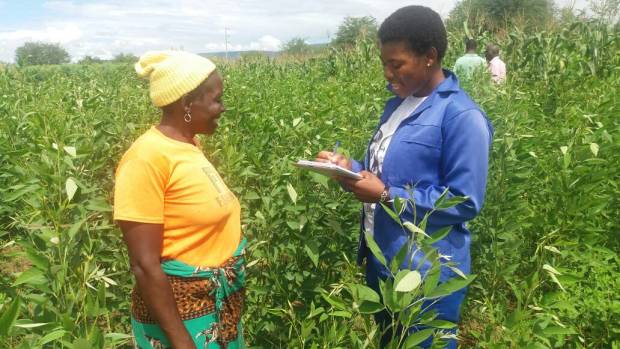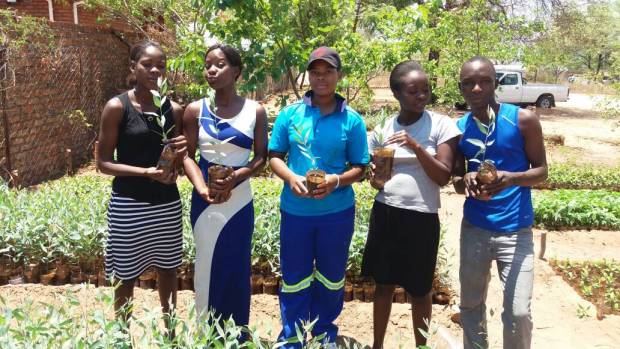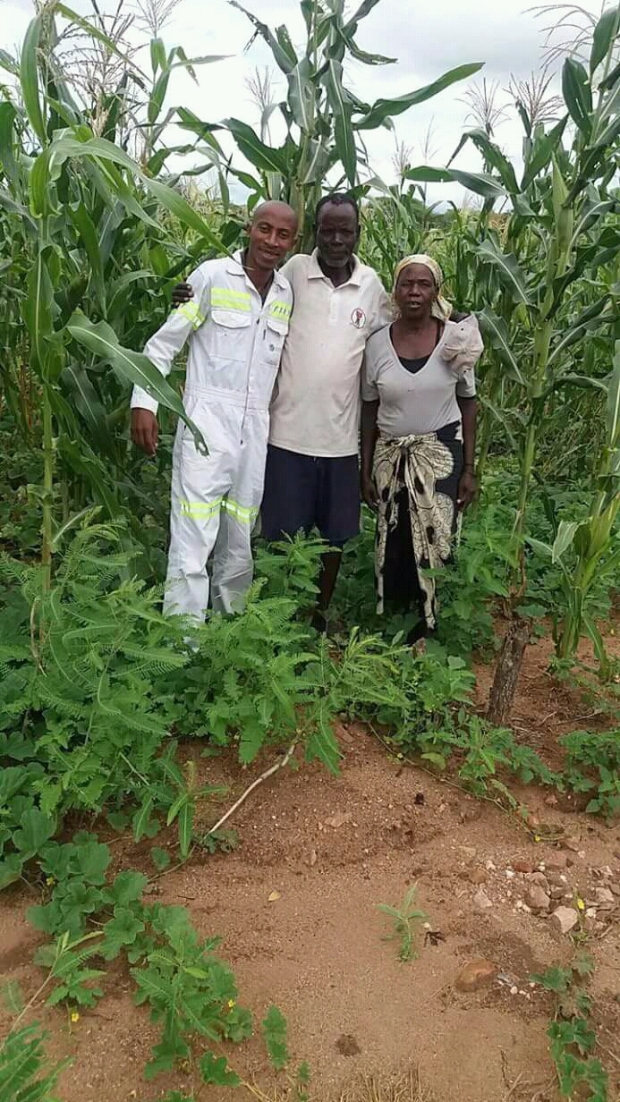By Mapuleng Molise, Seeder from Lesotho serving in Binga, Zimbabwe
It’s now a year of experience being a Seeder, living far away from my family at the age of 22, for which I thank God and MCC for always being with me and giving me support.
I started working with the organisation called Kulima Mbobumi Training Centre [KMTC]{Farming is Life} in November 2016. KMTC is an agricultural training centre. Its mission is to facilitate access to farm and off–farm training for the local inhabitants of Binga, to initiate projects that promote agriculture and skills development, to help farmers use natural resources in a sustainable manner, and to enable farmers improve water supplies, food production, health, and household income. KMTC has three departments which are Administration, Programming, and Support Services. KMTC works with the communities in 8 wards implementing Conservation Agriculture (CA), small livestock promotion, and Food for Work programs, and has a horticulture demonstration garden on its premises.
CA is the major intervention that is promoted to improve the food security of the communities. Major activities for the CA programme include farmer training using the farmers field school approach, lead farmer approach, seed multiplication, demonstrations, field days, and exchange visits. The Food for Work activities include construction and rehabilitation of earth and dams to improve community livelihoods, as well as conservation works to protect land from degradation. Under the small livestock promotion, KMTC is facilitating the “pass on a gift” campaign, where community members who received goats from KMTC will give some of the offspring to other farmers. This program is done to improve the livestock ownership in the community in order to enhance their safety nets in times of crisis. At its premises KMTC has a 1ha piece of land where demonstrations on good agricultural practices are done so farmers can come and see. On the demonstration farm we implement all conservation farming principles for horticultural and field crops including leafy greens, fruits, root vegetables, green mealies, and sugar beans.
When I first arrived at KMTC, I lived with a host family for the three full months, from November 2016 to January 2017. During the host stay I started learning about Tonga language and culture. The language was the most challenging thing during the early days. It was difficult for me to express myself to my host family, especially my young sister who was 3 years old. It was also difficult to communicate with people in the community because they spoke other Zimbabwe languages and little English. I am reminded of a time when my host brother called me in Tonga language saying, “Puly! kweza”, meaning “Puly, come”. My response was, “I’m kwez-ing” because it was trying to say “I’m coming” but I didn’t know how to say it correctly in Tonga. It also made me feel uncomfortable to be among my age mates (youths) when I couldn’t understand the language. Thankfully I had a teacher who helped me with Tonga lessons, which was very good because I quickly grasped the language. Now I can communicate with at work, at home, as well as with farmers in the community.
I’ve been attending church with my host family and this helped me grow spiritually. Seed taught me to be open about my background. I found that sharing has helped me to connect with other people in Binga in a way that helps them, because the more you share, the more people learn. I also had problems to adjust to the Binga temperatures which are very high. I am used to lower temperatures in my home country of Lesotho, but here in Binga daily temperatures range from 29 – 36 degrees Celsius.
As time went on, I got used to the amazing and loving people of Binga. I adopted the culture and ended up joining the acting industry where I am taking part in youth dramas. The youth are performing dramas to raise awareness on how certain cultural values and norms promote abuse of young girls.
After initial challenges in Binga I started to feel at home. I never expected to be welcomed so warmly or to feel so much at home right away. They treated me like a sister, and my neighbours are always so helpful to me and to each other. I had heard some negative rumours about Binga before I arrived, and I thought I wouldn’t fit in very well, but now I see that the rumours were all false. After the three months I relocated to my own apartment where I began to be more responsible for my own welfare and make plans for myself.
At work I spend most of my time with the Field Officer who is responsible for the livelihoods programming. During the working days, my major activities are the daily monitoring the CA and Food for Work projects. I join the field staff during monitoring visits to learn what farmers are doing and this helps me to really understand how such activities are carried out. I also gather field information for KMTC by taking pictures. In the field I interact with farmers, getting information on the challenges they are facing in farming and the measures they take to mitigate the challenges. Field work is very good because I gain a lot of experiences in CA, dam construction, conservation work, and small livestock production. KMTC has a demonstration on green manure and cover crops (GMCC) and I had a chance to see how legume cover crops improve soil fertility and learn the remedies for pests and diseases that attack those crops. Field visits facilitate cross learning between farmers, KMTC, and me. I also attended training of trainers workshops on CA, GMCCs, and post-harvest handling and processing. I used the knowledge from that training to help farmers whom I interact with during field visits. I also had chance to facilitate during the farmers training sessions under the farmers field schools. This had given me confidence in teaching other people and being more comfortable working in the field.
Other activities include joining the support staff on KMTC garden, planting, and managing the crops. At the garden, I also had my own bed of onions, leaf vegetables and green paper which grew very well and that’s where I was getting vegetables for my use at home. Currently I am having a small plot of 20m X 20m of sorghum and I will invite other youths to learn about CA. I have an intention of giving out the seed after harvesting to poor farmers in the community who have challenges obtaining seeds. I also give feedback to the organisation on all that I do in the field.
My first year has been full of learning and challenges. I have learned that cooperation, compassion, and hard work are the thing I must have in life. The experience that I am getting at KMTC and Binga is improving my welfare by strengthening my capacity to farm, sharing knowledge and information, and making me aware of some hidden talents that I have. Now I feel so independent and responsible for my future.

Mrs. Mumpande (left), a lead farmer in Ward 5 Binga, is having a discussion with Mapuleng Molise about the results of the green manure & cover crop demonstration plot in her community.

Mapuleng Molise (centre) believes that youth can have a positive impact in their home communities. She has helped initiate a project with the youth in Binga to grow and sell tree seedlings, and use the proceeds to give back to the community.



